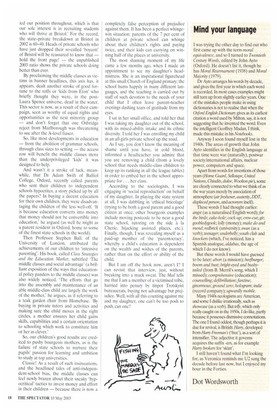Mind your language
I was trying the other day to find out who first came up with the term moral equivalence, and so I turned to Twentieth Century Words, edited by John Ayto (Oxford). He doesn't list it, though he has Moral Rearmament (1938) and Moral Majority (1979).
Dr Ayto arranges his words by decade, and gives the first year in which each word is recorded. In most cases examples might still turn up from slightly earlier years. One of the mistakes people make in using dictionaries is not to realise that when the Oxford English Dictionary gives as its earliest citation a word used by Milton, say, it is not suggesting that he invented the word. Even the intelligent Geoffrey Madan, I think, made this mistake in his Notebooks.
Anyway I soon found myself lost in the 1940s. The areas of growth that John Ayto identifies in the English language at that time were war (naturally), postwar society/international affairs, nuclear power, computers and space.
Apart from words for inventions of those years (Home Guard, Sellotape, United Nations, Chindits, dukw, Woo/ton pie), some are clearly connected to what we think of as the war years merely by association of atmosphere (air freshener, austerity, DDT, displaced person, and acronym itself).
These words I had thought earlier: angst (as a naturalised English word); for the birds; cake-hole; cock-up; crew-cut; git; goobledygook; lolly (money); make do and mend; redbrick (university); swan (as a verb); teenager, underbelly; youth club and knockers (which, I've noticed, has a Spanish analogue, aldabas, the age of which I do not know).
But these words I would have guessed to be later: abort (a mission); beefburger; boom and bust; bright-eyed and bushytailed (from B. Merril's song, which I missed); comprehensive (education); counselling, defibrillation; fanzine; ginormous; ground zero; hologram; indie (record company); upwardly mobile.
Many 1940s neologisms are American, and some I dislike irrationally, such as showcase (as a yob). But telk, which only really caught on in the 1950s, I do like, partly because it possesses dismissive connotations. The one! found oddest, though perhaps it is due for revival, is British: Hany, developed from Harty Freeman's (tree), as a sort of intensifier. The adjective it governs acquires the suffix -ers, as for example Hany brokers for 'skint'.
I still haven't found what I'm looking for, as Veronica reminds me U2 sung the decade before last now, but I enjoyed my hour in the Forties.
Dot Wordsworth


































































 Previous page
Previous page